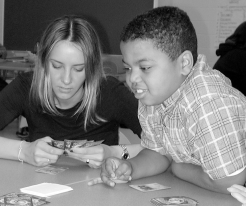p. 13
![]()
May 17,
2001
| ‘Visiting professors’
teach math using Pokémon game p. 13 |
|
 |
| Aaron Johnson (right), a
third-grader from the LACC, teaches UD student Jackie Cresswell the game
of Pokémon. photo: KATHY FLICKINGER |
Five "visiting
professors" from the Latin American Community Center (LACC) in Wilmington came
to the Willard Hall Education Building on Tuesday, May 8, to instruct a
classroom of education students on using the fine art of playing Pokémon cards
as a math resource.
Luis Diaz, Jean Espinosa, Sergio Gomez, Aaron
Johnson, and Angie Karduss, all elementary school students, each got a turn in
front of the classroom, using a projector to explain the intricacies of the
game. They then split off into groups, each walking several college students
through their first rounds of card "battle."
Some of these
young students are failing math, but ask them how many damage points a Psyduck
can do to a Charmander and they can do the multiplication and subtraction in
their heads. Some are reluctant readers and writers in their regular classrooms,
but entice them with a chapter book featuring their favorite Pokémon characters,
and they’ll fight over who gets to read it first.
How can this
phenomenon be explained? Winning a popular game among peers makes for excellent
motivation. "You’re not gonna let the other person beat you," Angie said. "You
remember what [numbers] you had and what the other person had."
UD
professors Eugene Matusov and Maggie Matthias team-teach the course
"Instructional Strategies and Literacy Methods" to undergraduates in the School
of Education. Through this event, they said they are hoping to introduce their
students to the idea of inviting children’s culture and activities into the
classroom as a means of stimulating and encouraging learning. Matusov and
Matthias hope that events such as the "visiting professor" program can help
produce a generation of educators who take note of their students’ interests and
use them to further learning–instead of merely confiscating their cards and
sending them back to their workbooks.
"We want to teach our
students, preservice teachers, how they can bridge home and school," Matusov
said. "We also want to illustrate to our students that they can and should learn
from children about how to develop learning activities that are relevant to
kids’ lives."
Another goal of the program is to encourage young
learners from socioeconomically disadvantaged backgrounds and difficult academic
histories to value themselves as knowledgeable individuals. Along these lines,
all of the children at the May 8 program received official ‘Certificates of
Appreciation’ from the University in recognition of their teaching
contributions.
"Unfortunately, many LACC kids have negative
experiences in their schools," Matusov explained. "We want to make a point that
UD is their University, a place where their mastery and knowledge are welcome
and appreciated."
The LACC has long been a haven for children from
disadvantaged Wilmington communities, providing a variety of programs for kids
who need guidance and structure in their lives. Steve Villanueva, a computer lab
instructor at LACC who accompanied the Pokémon players on the visit, described
the center as a place where "we try to help the kids build better school work
skills."
In fact, some of the center’s programs go far
beyond that. Along with afterschool help in reading, writing and mathematics,
LACC offers classes in dance, karate and computers. In Villanueva’s lab, the
kids learn how to build computers from scratch, which they get to keep at the
end of the program.
The community center’s computer lab has been
supported by the University of Delaware through donations of computers and
through La Red Magica/The Magic Web mentoring program which brings UD education
majors to the LACC to work with youth.
"We are good…friends and
partners with LACC," Matusov said. "We are involved in planning together
educational activities for UD students and LACC kids…. At UD, we treat [LACC
staff members] Gladys Coto and Steve Villanueva not only as partners and
consultants but also as ‘community faculty’ and ‘community professors.’ They
both are frequent speakers in my class on cultural diversity and a part of the
CBTE initiative."
–Jeanine McGann